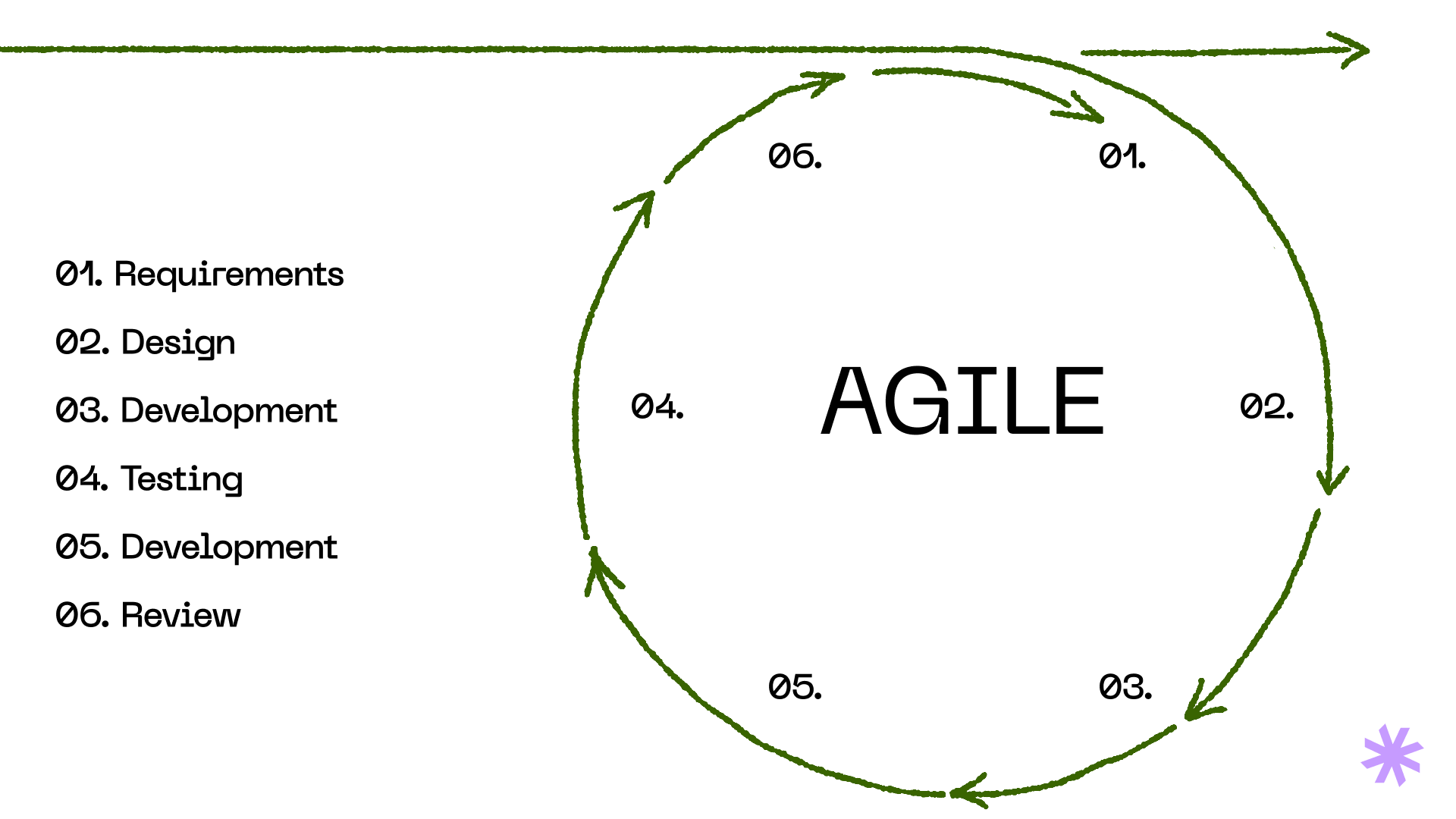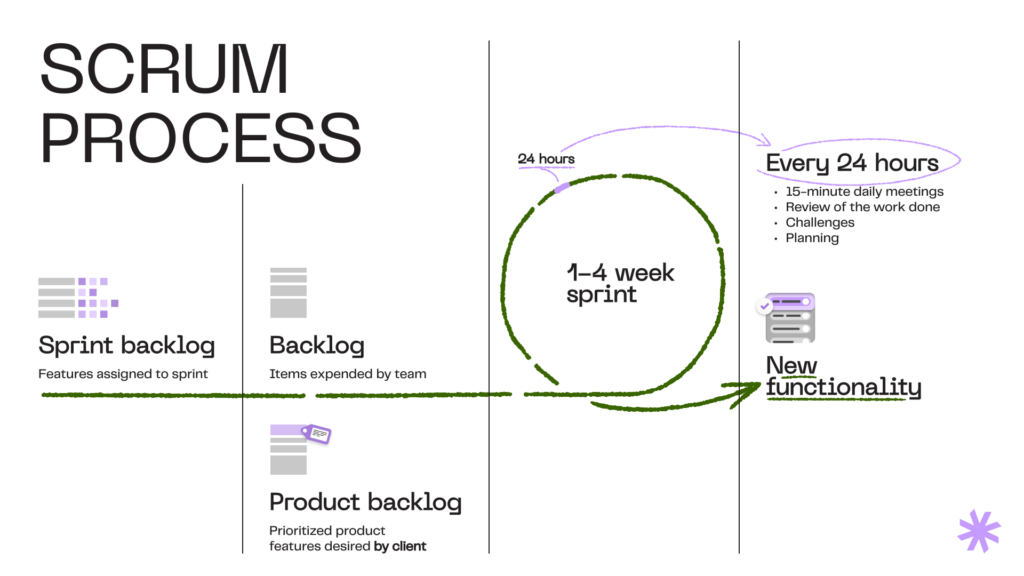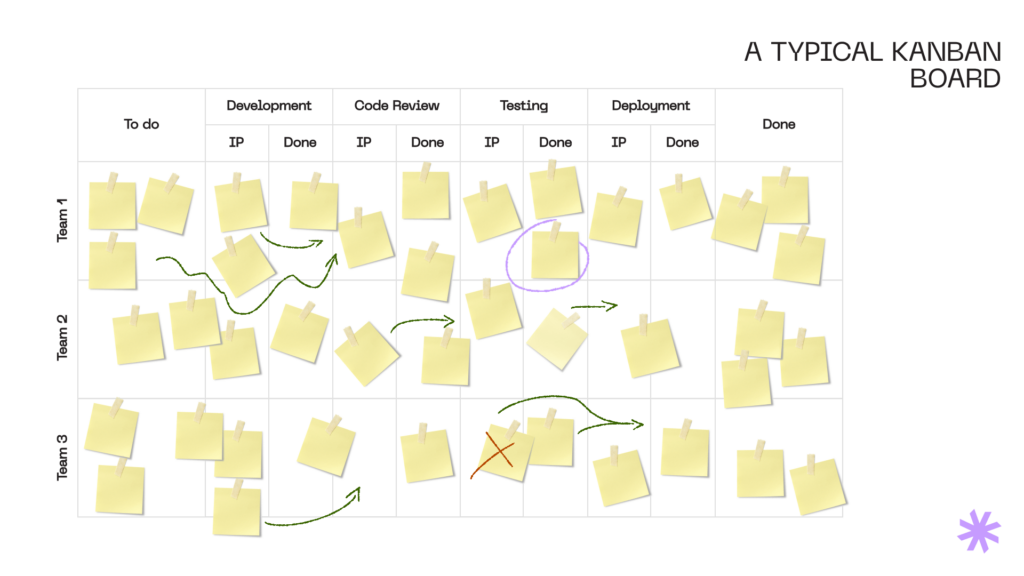Statista predicts that the revenue in the software market will reach $824,848 billion in 2026. These figures show that companies are eager to spend on the software development process to increase the efficiency of their business.
Besides, bespoke software helps them fight off market rivals and become industry leaders.
This article aims to introduce readers to the concept of custom software product development. Here, we will discuss the main stages of the software development process and the most popular project management models.
These valuable insights will enable you to derive maximum benefits from the custom software development process.’
Software development process
Basically, any technological business idea should go through certain stages of software development to become a successful and profitable software solution.
To define these key software development stages, we use the term software product development lifecycle. Its primary goal is to ensure the efficient and timely delivery of a high-quality digital solution that meets the market demand.
In addition, the clearly defined software development process gives both the customer and the software development team a better understanding of the project objectives and deliverables for each software development step.
Finally, the software development process will help customers establish transparent communication with the software development team. The joint efforts of both parties will lead to the successful launch of a high-quality digital product.
The main software development process steps
The time has come to take a closer look at the SDLC steps. We will show you how each stage is implemented by a software development company and what development processes take place there.
It is worth noting that the steps we are going to explore are identical to any software development process. At Syndicode, we also follow these specific software development steps to ensure the highest quality of the software we deliver.
The main stages of the software development cycle are as follows:
- Planning
- Analysis
- Design
- Development
- Software testing
- Deployment
- After-launch maintenance and support
Schematically, SDLC steps can be presented this way:

Software Development Process: Business analysis (Pre-sale)
Before you engage fully in the software product development process, you need to validate your business idea. In simple terms, you need to make sure that there is actual market demand for the product you are going to build. Testing the feasibility of your business idea requires taking the following steps:
- Narrowing down the target audience.
- Identifying the key pain points of potential customers and the solutions to these issues available on the market.
- Defining how you are going to address these pain points with your product.
- Finding out whether the digital solution is revolutionary enough to be worth the end user’s time and, more importantly, money.
Business analysis will help you with all these tasks.
The business analysis stage can be divided into two phases: pre-sales (also known as Discovery) and the business analysis of the project.
The pre-sale phase starts with identifying the initial project requirements. Later on, these requirements are transformed into user stories. These are small pieces of information describing the features of the future project. User stories will help the software development team provide the customer with the first estimates.
If we have already started speaking about the web development team, it will not hurt to outline its key members and their responsibilities. They are as follows:
- Business analyst. This specialist is required for assessing a business idea and key input data, such as business model, core features, and specific requirements. Armed with these valuable insights, the business analyst will be able to form precise technical specifications for the software development team.
- Software Development Team Lead. This specialist is responsible for providing proper technical solutions to potential bottlenecks. The team lead undertakes communication with project managers and business analysts to keep software developers focused on their current project tasks.
- UX/UI designers. They create an informational architecture of a future digital solution. Other tasks of the UX/UI design team include creating mockups, wireframes, and interactive prototypes. With their help, both customers and the development team get a better understanding of the look and feel of a future digital product.
- Back-end developers. Their task is related to building the server side of a web product. To be more specific, they handle business analytics, databases, third-party integration, and caching.
- Front-end developers. Front-end developers are responsible for the client side of software products. Their task is to make sure that the software solution is easy to use for both first-time users and experienced ones. Apart from that, front-end developers build fast-loading user interfaces that are capable of fixing complicated front-end challenges.
- Quality assurance engineers. They perform manual and automated tests to make sure that each feature of a software solution works as it should and that the system does not have bugs or glitches. Also, quality assurance engineers verify that the digital product meets all technical requirements specified beforehand.
- Project managers. These specialists keep track of the whole software development process. They set deadlines to make sure that the project will be delivered within a predefined scope and budget. Apart from that, project managers assign responsibilities to the software development team, monitor changes to the project scope or schedule, and manage the relationship with the client and relevant stakeholders.
Looking for a team for your project?
Syndicode has excellent specialists in a range of fields. Please describe your needs, and we will provide you with relevant candidates.
Contact usSoftware Development Process: Business analysis on the project
The idea has been validated, and the initial requirements have been collected. However, how can we ensure these requirements are adhered to, and do they align with the business’s long-term strategy?
These questions are addressed during the business analysis phase. In fact, this phase is so crucial that some companies choose to invest in separate business analysis services, distinct from development.
During this phase, several things happen.
First, the business analyst creates wireframes. They look like hand-written sketches that provide a rough idea of what a future app will look like. They will be further sent to the customer for approval to make sure both the customer and the development team are on the same page. If everything is okay, the wireframes are given to the UX/UI design team.
Alongside the wireframes, the business analyst creates a document where all the requirements are specified. For example, if we speak about authorization, a user should be able to log in, reset a password, or change the email address. All these conditions should be mentioned in this document.
The project requirements are further tested by the quality assurance team. When the QA engineers understand how the future software product should work, they will know how to test it properly. As a result, it is easier for them to prepare a testing plan and testing documentation.
It should be noted that testing the requirements is beneficial not only for the quality assurance team but also for the software developers. They get high-quality requirements, which make it clear to understand what they should do. Besides, this approach reduces the number of new requirements that appear after the software development process has already started.
After the requirements are approved by the customer, the business analyst writes software requirement specifications where all requirements are structured properly. At the project’s end, the customer gets this documentation to know how the whole system should work.
The next step is to create epics and tasks for developers. Epics describe the high-level features available for users. Consider buying functionality on marketplaces. It is a good example of epics. Epics are further divided into user stories where the ins and outs of each feature are described. They serve as a basis for the tasks created for the development team.
When the software development team starts working in sprints, the business analyst attends daily meetings. This specialist discusses the tasks completed in the previous days and defines the tasks that should be done next.
Also, the business analyst is engaged in the activity called backlog refinement. This process introduces the team to the requirements and product features so they can make estimates. In addition, the business analyst, together with the customer or product owner, defines which tasks should be chosen for the next sprint.
To sum it up, below you can see the list of documents prepared at the business analysis stage of the software development process.

Software Development Process: Design
As soon as all requirements and specifications are finalized and documented, the UX/UI design team starts the software design process. Their task is to determine what the future digital product will look like and what functions it will perform.
At this stage, it is still too early to talk about the aesthetics of the future software solution. Functionality and flow are more important here.
The design phase starts with analyzing the project requirements. This valuable information will help UX/UI designers create the information infrastructure. Its main purpose is to receive a clear and transparent system that will be further developed by the software development team.
An important part of the software design process is wireframing. Wireframes are static, low-fidelity representations of your future software solution. They can be seen as the skeletal framework both UX/UI designers and software developers should follow. They are built based on user stories received at the business analysis stage.
UX/UI designers use gray colors and do not add any images or logos. This minimalism helps them keep the focus on usability instead of visuals.
Later on, wireframes are developed into interactive prototypes. They are mid-to-high-fidelity design models of your future digital product. Apart from offering a detailed look at the visual attributes of the design, they include first user interaction. Prototypes serve as a basis for creating UI designs that will be presented to customers later.
As soon as the client approves the final UI design, the software development team will take on the project.
Software Development Process: Building core functionality
The software product development phase is the stage where all designs, system architecture, and product functionality take the form of written code. Software developers actually build a digital product based on the specifications and requirements outlined earlier.
They follow the coding guidelines, rules, and best practices to make sure the software they build is safe, reliable, testable, secure, portable, and maintainable.
Specific project requirements and features you want to build will impact your choice of the technology stack.
You should not underestimate the importance of the right technologies. In the future, you need to scale your project to handle an increasing number of concurrent users. Besides, you should release regular updates to stay relevant. The right tech stack will help you accommodate the evolving needs of your audience and your changing business tasks.
At all events, opt for mature technology such as Ruby, Python, PHP, etc. Otherwise, the software project can suffer from bugs, vulnerabilities, or an insufficient knowledge base.
The full list of technologies used:

Apart from coding, the development team deals with setting up the infrastructure and documenting how the system should work.
This stage is relatively straightforward, provided the development team has a carefully crafted software development plan at hand.
Software Development Process: Quality Assurance testing
We mentioned earlier that the quality assurance engineers should join a new project at the pre-sale stage. In this case, they test project requirements collected by the business analyst and ask clarifying questions to help software developers build the application’s architecture the right way.
When the app’s architecture is built, quality assurance engineers start testing it to define which modules or databases will be used and how separate parts of the product will interact with each other.
To sum it up, the quality assurance at the beginning of the project implies the active collaboration of QA engineers with business analysts. Together, they specify the project requirements and implement certain steps aimed at improving the software development process.
However, there are situations when quality assurance engineers join the team in the middle of the project, the requirements are already specified, and the software development process has already started.
In this case, QA’s test pieces of functionality as far as they are completed. First of all, they test the back end and front end separately. After that, quality assurance engineers test the functionality as a whole.
Quality control
This process implies preparing testing documentation. It includes an overall test strategy and testing plan for each user story. In addition, quality assurance engineers create checklists to test tasks that have been completed by the software developers. All those documents, along with testing reports, can be further sold to the customers.
Software testing
At this stage, quality assurance engineers perform manual and automated tests to uncover any bugs, system glitches, or defects. Though manual testing is slower and more tedious compared to automated tests, it helps handle complex scenarios more efficiently. Besides, the risk of false negatives is lower there.
Manual tests are best suited for the verification of implemented functionality and set requirements.
For time-saving purposes, manual tests can be accompanied by automated testing. It implies writing test scripts with the purpose of automating the test execution process. The key benefits of automated testing are the ability to perform more tests in less time and greater test coverage.
Automation is a good option when QA engineers need to execute a vast number of tests with recurrence or for performance testing.
The picture below shows what kind of tests should be performed to ensure the high quality of a software product and its functionalities:

As soon as the quality assurance engineers make sure that there are no system errors or bugs, the software can be deployed to production.
Software Development Process: Project launch
The deployment stage is the final and most important stage of the software development process. It implies putting your digital project into production.
The most important task here is to make sure that the code, data, and all components are deployed the right way. Also, it is important to check whether the solution delivered meets all specific requirements.
To accomplish these vital tasks, quality assurance engineers perform manual and automated tests. If there are no bugs or glitches, the product goes live. It means that the software solution can be used in a real environment by your target audience.
Apart from that, the software development team creates release notes. These are technical documents with core information about the software. It may include technical advancements or bugs that have been fixed. Release notes are aimed at the product users, however, they also can be used for internal purposes.
Software Development Process: Maintenance
The software development lifecycle does not end with the product launch. Developers should be ready to tackle any technical issue or bug reported by the end-users. After all, the fact that the solution was working flawlessly upon release does not mean that there will not be any bugs in the future.
Besides, to stay relevant and competitive, the product should get new features and regular updates, both big and small.
In this regard, the software development team becomes responsible for adapting the digital solution to ever growing needs of the target audience.
In general, software development companies can offer customers the following four types of maintenance activities:
- Corrective software maintenance. It aims at fixing bugs that have been identified
- Preventive software maintenance. As the name suggests, these activities imply timely checks to minimize any technical issues with your digital solution
- Perfective software maintenance. These activities include optimization and adding new functionality to enhance the existing solution.
- Adaptive software maintenance. It suggests adapting the software to your changing business needs, be it moving to the cloud or adapting to new policies of third-party tools.
The most popular software development models
The time has come to discuss the most popular software development models. We will delve into the pros and cons of each methodology. Such a comprehensive approach will help you choose the right option for your project.
So why do we need these SDLC methodologies to start with? Each of them aims at increasing the efficiency and speed of the application development process.
For your part, you will know about the tasks the development team is currently working on. Consequently, you will easily monitor and guide their activity. Such transparency will allow you to save money and streamline the software product development process.
Finally, you will keep track of the current status of your project.
End-to-end software development
Syndicode can transform your idea into a fully functional product, utilizing our extensive expertise and skilled team to bring your vision to life. Fill out a form to get a personalized offer on our turnkey software development services.
Contact usAgile
To start with, Agile is not a methodology. It would be more accurate to call it a set of various methodologies and frameworks.
The principles of this approach are noted down in Manifesto for Agile Software Development. Let’s take a look at the most important of them.
- Individuals and interactions over processes and tools
- Working software over comprehensive documentation
- Customer collaboration over contract negotiation
- Responding to change by following a plan
The main idea behind this approach lies in breaking a software development process into smaller parts. They are called iterations. Agile is all about making gradual changes at each iteration.
The key benefits of the Agile approach are:
- Fast delivery of a working solution/functionality/components
- Quick adaptation to the changing circumstances
- Active collaboration
- Quick issue detection
- Transparency
- Never-ending product improvement
If you are considering adopting Agile methodologies, bear in mind its downsides, as in:
- Insufficient documentation
- Careful planning can be put aside for the sake of immediate reaction, adaptation, and improvement.
So when will the Agile methodologies work for your project? This option will fit the projects with cyclical processes where incremental results will bring additional value to the product.
Also, you should be ready to take an active part in the software development process. The software development team needs your constant feedback to respond quickly to your evolving needs and requirements.
At the same time, Agile will not work for you if you need a clear picture of the project timeline and budget.
At Syndicode, we stick to the Agile principles when building minimum viable products where fast response to users’ feedback is required.

Scrum
Though Agile and Scrum are often confused, the difference between these two terms is more than meets the eye. Agile is a broad concept. It is something like philosophy or orientation. Scrum, in its turn, is a specific methodology that defines how your project will be managed.
Speaking about sprints, they are short phrases that usually last two weeks. Each sprint starts with planning, where the software development team identifies which small part of the project scope should be completed during this time.
The tasks for each sprint are taken from a backlog. It is created by the product owner to prioritize tasks for the project.
Since Scrum can be seen as a subset of Agile, their benefits are pretty similar:
- Increased productivity
- Reduced costs
- Improved user satisfaction
- Fast release
- Great flexibility when it comes to changes.
However, like any other project management methodology, Scrum is not perfect and has the following downsides:
- It can be hard to adopt Scrum in big teams.
- The efficient Scrum adoption requires experienced software development professionals.
- A high level of commitment is a must.
Be aware that Scrum will not work for you if your project has fixed product specifications or when you need a unified solution to many issues. For example, it will not help if you lack product vision, good technical practices, or there is a conflict in the team.

Kanban
Kanban is a system aimed at visualizing your workflow. The Kanban boards are used to track the current status of each task. Each software development phase gets its column.
In the same way, each task takes a separate card on the board. These cards are moved from column to column until the task is completed.
A traditional Kanban board has three columns, which are to-do, doing, and done. The first column is like a backlog. Here, you can see tasks that have not yet been taken care of. The second column contains tasks in progress. Finally, the last column shows completed tasks.
The benefits of the Kanban board include:
- Improved visibility
- Enhanced flow efficiency
- Improved productivity
- Clear team focus
- Eliminated waste
- Flexibility
- Efficient collaboration.
The downsides of Kanban are as follows:
- Lack of specific timeframes for each software development phase can negatively influence the software development process.
- Kanban boards can become outdated, cumbersome, and overcomplicated.
- The approach will work for you, provided you have stable and consistent project plans.
Finally, the Kanban approach will suit you if you want to concentrate on delivery rather than planning. Also, it is a good option when there are many incoming requests, and each of them has a different size and priority.
Below, you can see an example of a Kanban board.

Waterfall
The idea behind the waterfall methodology is completely different from the philosophy of Agile. You can proceed to the next stage of software development only if the previous one is completed. This linear approach does not suppose overlapping or going back.
In contrast to the Agile methodologies, constant status updates are not necessary. It means developers can work independently from the customer at each stage of the software development process. These stages are requirements, design, implementation, testing, and maintenance.
Ideally, there should be a certain stage gate between software development steps. You need to use it for reviewing and approving the project requirements. Only after that the design stage can begin.
Let’s take a look at the key advantages of the Waterfall approach:
- A plain and simple sequence of steps
- The overall goal is defined much earlier
- Your active participation is not required
- Straightforward transfer of information at each stage
- It is easy to measure the project’s progress since you know its scope from the beginning.
However, we should not forget about the weak spots of the Waterfall methodology. These are:
- You will get a working solution only at the end of the software development process. As a result, your competitors may enter the market earlier, and you will lose the market share.
- You may invest a lot of time and money to find out there is no actual interest in your product.
- Lack of flexibility
- Testing is performed closer to the project’s end
- The approach leaves no room for sudden changes.
The Waterfall model works best for software development projects where changes can be too expensive or time-consuming. It can be the right option for stable projects with careful planning. However, it will not fit your project if it requires a great degree of flexibility.

V-Shaped model
The V-shaped model is otherwise known as the validation and verification model. With this methodology, software developers can proceed to the next software development step only if the previous one is completed. In the V-shaped model, the testing phase follows each stage of the application development process.
The advantages of this model are as follows:
- It is simple and straightforward.
- Concentration on validation and verification helps build a high-quality product.
- With this model, you can track the progress of your project more accurately.
- Owing to the rigidity of the V-shaped model, you can manage your project much easier.
The disadvantages of this model include:
- No early prototypes (The solution is delivered at the end of the implementation stage of software development.)
- No flexibility
- High-risk.
This model is a good option if your project has a tight budget and time constraints. Software development companies that adopt this model will deliver a cost-effective solution for you fast.

Spiral model
The Spiral methodology takes the best from iterative development and the Waterfall model. In very simple terms, it is the Waterfall approach with the primary focus being placed on risk analysis.
Compared to other project management methodologies, there are only four stages of software development—planning, risk analysis, engineering, and evaluation. The project goes through them an unlimited number of times until it is completed. This way, multiple rounds of advancements become possible.
However, here, developers should have a clear understanding of the extent of necessary changes. Otherwise, the spiral can become an infinite loop.
The clearest benefit of the Spiral model lies in improved risk management. At the beginning of each iteration, the software development team considers the potential risks and defines the best ways to reduce them or fix a potential bottleneck.
Let’s dig into the main pros of the Spiral model:
- Better accommodation of business requirements
- Allows vast usage of prototypes
- More precise focus on requirements
- Enhanced risk management.
The downsides of this methodology are as follows:
- Management is more difficult.
- There are no clear deadlines for the project’s end.
- The project may go through the spiral indefinitely.
The Spiral model works best for projects with complicated requirements, and evaluation is required to clarify them. At the same time, it will not fit low-risk projects.
Iterative incremental model
When adopting this approach, the project is divided into repeated software development phases, the so-called iterations. With each new iteration, the project team gets a better understanding of the product.
It works the following way. The software development team, together with the customer, decides which feature to build and implement. Each iteration should go through the specific software development steps—requirement analysis, designing, coding, and testing. The carefully crafted software development plan is not that necessary in iterations.
Let’s discuss the main benefits of the incremental and iterative approach:
- Early delivery of the primary features
- Fast initial product release
- Quick accommodation of the evolving requirements
- Working version of the product at the end of each increment.
The disadvantages of the approach we would mention are as follows:
- Total cost of a ready solution can be high
- Effective iteration planning is required
- The total cost of a completed solution is pretty high,
The incremental and iterative model will suit your project if you have precise requirements. Also, this approach will help reduce stress when a new complex software product should be introduced in one stroke. Finally, use the incremental approach when you need to release your product in the quickest time possible.
RAD
The acronym RAD stands for Rapid Application Development. The basic idea behind this approach is less planning for the sake of rapid prototyping. Prototypes are working models that can be seen as product components.
As applied to the RAD approach, the functional modules are built along with prototypes. They are implemented together to form a completed software product that can be delivered pretty fast.
Since detailed pre-planning is unnecessary, the development team will integrate the required changes within the software development process much more easily.
So, what benefits can you derive from the RAD approach?
- Changing requirements is not an issue.
- You can easily measure the project’s progress.
- Iteration time is short, provided that the software development team has the right tools.
- The reusability of software components is increased.
- RAD improves productivity.
- Integration at the very beginning addresses many integration issues.
The disadvantages of the RAD model include:
- Highly-skilled designers or developers are required.
- Excellent modeling skills are a must.
- The approach is applicable to projects that can be modularized.
- Complex management.
Bear in mind that the implementation of the RAD methodology can be rather expensive. The reason is the high cost of modeling and automated code generation.
Final thoughts
When building any kind of digital product, you need to understand what is going on at each stage of the software development process. Thus, you will be able to achieve your ultimate goal and release a unique, high-quality software solution that will meet the market demand.
Syndicode provides a dedicated software development team for the implementation of revolutionary and innovative software projects.
Frequently Asked Questions
-
Why is the software development process important?
There are several reasons why the established software development process is so important. First, both customers and the software development team will have a clear understanding of the project objectives and deliverables for each software development stage. Second, it will clarify the roles and responsibilities of each team member and thus, increase the efficiency of the software development process. Finally, the right software development practices will help customers establish communication with the software development team and manage their software development project successfully.
-
What are the main stages of software development?
Traditionally, the main stages of the software development process are planning, where the subject idea is explored, and potential bottlenecks are identified, analysis that aims to define the system requirements. These stages of the software product development lifecycle are followed by the design phase, where clickable prototypes are created and tested on end-users to get immediate feedback. As soon as the design phase is completed, the development stage takes place. Here developers build digital product functionality. These features are further tested by quality assurance engineers. When everything is okay, the written code and all data are deployed to production and a web product goes live. After that, the customer can count on after-launch maintenance and support of an outsource software development agency.
-
What is the purpose of planning a software development?
The clear software development plan has several purposes. In general, it provides customers with a clear understanding of what will be happening throughout the whole software product development process. Speaking about specific reasons, they are as follows. First, the software development plan aims at defining the basic project requirements. They will serve as the basis for further project scope and, consequently, time and cost estimates. Second, the software development plan helps uncover the potential bottlenecks and find the most relevant solutions to fix them. Finally, it allows the software development company to create a project scope to provide customers with the team structure, project timelines, and deliverables.
-
Benefits of the software development process
Companies can derive multiple benefits from the established software development process. First, they know exactly what deliverables they should get at the end of each stage of software development. Second, it allows businesses to get accurate time and cost estimates. Third, it helps achieve transparency of the whole project. Customers can easily monitor the activities of the software development team, tasks at hand, and the progress of their application development process. Finally, the software development process reduces risks usually associated with the launch of a new software solution.
-
Which methodology is best for software development?
Actually, there is no best software development methodology. Each of them is good in its own way and can be applied to specific projects. So when choosing the project management methodology, you should consider project complexity, scope, and your particular business requirements. For our part, we would say that Waterfall is best suited for small projects. At the same time, if you build a big project with a certain degree of flexibility, Scrum is the most popular option for the application development process.
